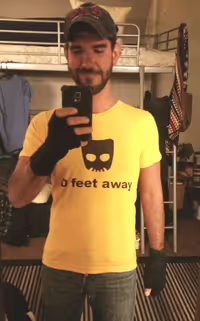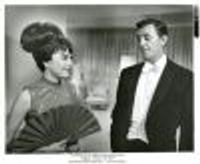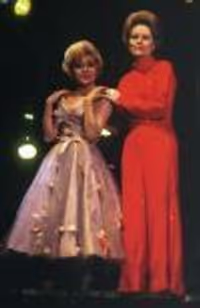Meryl Streep's harsh words about Walt Disney.
#50Meryl Streep's harsh words about Walt Disney.
Posted: 1/9/14 at 8:36am
And A:OC surely won’t be nominated. We do the AMC Best Picture Showcase every year, so I try to predict the nominees to avoid sitting through a bad movie twice. And not that “Saving Mr. Banks” won’t play fine on DVD, but with my work schedule lately, I’m trying to be choosy about what I actually venture out to the cinemas to see.
Have you ever done the Best Picture Showcase? You would love it.
Although you’re probably seen most of the likely nominees by now.
#51Meryl Streep's harsh words about Walt Disney.
Posted: 1/9/14 at 8:56am
I think there is one other moment in "Saving Mr. Banks" where Tom Hanks drops the "Uncle Walt" routine, and for a fleeting instant, we see the absolute monarch asserting his authority to get what he wants. It's almost a throw-away line, or at least it would be if Hanks weren't playing the part. And it's a trivial instance, which is why it's unexpected. But he actually sinks his teeth (and claws) into the line, and I thought it was very revealing.
When Walt is trying to get Pamela to ride the carousel at Disneyland, and she objects and rolls her eyes and refuses. He completely drops his "sweetness" routine and says (rather harshly and loudly and in public), "Get on the horse, Pamela!!"
He almost barks it at her. It's a direct, blunt order from the "commander in chief," and Hanks says it exactly that way. I was surprised when I saw it in the scene. He bulldozes her with intimidation for that one line with his "I'm in charge here and don't you forget it" manner. And it works. She is silent, and she gets on the horse.
I thought that said a lot about Disney and even Hanks's opinion of him, to have him lose the "charm" routine and change his tone so completely. And as soon as she gets on the horse, he goes right back to "Uncle Walt" again. The "power play" is over, and he won.
Very well played.
blocked: logan2, Diamonds3, Hamilton22
#52Meryl Streep's harsh words about Walt Disney.
Posted: 1/9/14 at 12:49pm
Many people have things in the closet and out of them.
Robert Byrd was revered in the Senate yet in his youth he was a member in good standing in the KKK. Everyone seemed to be OK with that. Al Sharpton's sins seem to have been forgotten as well.
PL Travers may be having the last laugh as Poppins is a Disney milestone and yet it was reported she had bi sexual affairs. Did Walt know? If so, did he care? It is all about the benjamins and this was his dream to make this film. Jerry Lewis is a legend and yet he made a stupid remark about women comics.
Let the dead rest in peace and remember him for all the good he did and the joy he brought to children. My admiration for Streep just took a hit. Bad timing and bad form, Ms Streep.
#53Meryl Streep's harsh words about Walt Disney.
Posted: 1/9/14 at 12:52pm
"Many people have things in the closet..."
From your closet to God's ears.
#54Meryl Streep's harsh words about Walt Disney.
Posted: 1/9/14 at 12:59pm
Here's a full transcript of Meryl's speech which to me really shows that the whole thing was blown out of proportion by Variety.
Meryl Steep and Emma Thompson Speeches
FindingNamo
Broadway Legend Joined: 7/22/03
#55Meryl Streep's harsh words about Walt Disney.
Posted: 1/9/14 at 1:08pmWhat's great about people like Robert Byrd is when they realize their own stupidity and atone for it.
#56Meryl Streep's harsh words about Walt Disney.
Posted: 1/9/14 at 1:14pm
'PL Travers may be having the last laugh as Poppins is a Disney milestone and yet it was reported she had bi sexual affairs. Did Walt know? If so, did he care?'
Walt Disney fired child star Tommy Kirk for being gay. I did a one-man show about it. BEFORE Durang put it in V&S&M&S.
#57Meryl Streep's harsh words about Walt Disney.
Posted: 1/9/14 at 1:34pm
Oh please, Walt didn't just walk up to Tommy and say "You're gay? pack your things fag" out of nowhere. Kirk was having a sexual relationship with a younger teenage boy, and the boy's mother knew and was making complaints to Disney…IN 1963. Any company would have fired someone for that in 1963. Disney never smeared Kirk's name in public, but he did rehire him though for The Monkey's Uncle.
If Walt was some special Hitler in disguise-dark prince of Hollywood, he sure had a funny idea of what being evil entails.
#58Meryl Streep's harsh words about Walt Disney.
Posted: 1/9/14 at 1:38pm
What about Dick Clark, Benny?
"Philadelphia’s gay hangouts – and if any of the show’s teens were discovered as being openly gay, the horrified host would banish them!
Handsome gay 14- to 17-year old males who helped popularize dance crazes like the Slop, the Continental, the Fly and the Hitchhike could stay on “Bandstand” as long as they looked straight. But any open hint of homosexuality got them kicked out the door – and the teens knew it in no uncertain terms.
[“Bandstand” regular, Eddie] Kelly revealed, “Philadelphia’s Rittenhouse square was known as a meeting place for homosexuals. If you were seen in the square, you couldn’t go on ‘Bandstand.’ So most of us really stayed away.”
But his same-sex secret actually made Brancaccio start going to the show when he was 14 years old!
“I went to ‘Bandstand’ because I was gay and I was a misfit in my neighborhood. I lived in very tough South Philadelphia,” he says. “I’d see these kids dancing and instinctively I knew I could fit in with them. I went to coffee shops, but I also hung out in Rittenhouse Square and so did many of the dancers. It was no secret. When I used to walk down the streets of Philadelphia and be recognized, I’d be called a ‘Bandstand f*****.’”
http://www.towleroad.com/2014/01/dick-clark.html
#59Meryl Streep's harsh words about Walt Disney.
Posted: 1/9/14 at 1:53pmWho da fuq was talkin bout Dick Clark?
#60Meryl Streep's harsh words about Walt Disney.
Posted: 1/9/14 at 2:04pm
'If Walt was some special Hitler in disguise-dark prince of Hollywood, he sure had a funny idea of what being evil entails.'
You should dial back to about a 6. I never claimed he was Hitler...or Hitler-like. I was answering the question of whether Walt might have cared if Travers' bisexuality were to come out. My best guess is 'yeah.'
#61Meryl Streep's harsh words about Walt Disney.
Posted: 1/9/14 at 2:08pmThe whole world would have cared back then if Travers were outed. Her children's books would have been yanked off the shelf and burned at rallies.
blocked: logan2, Diamonds3, Hamilton22
#62Meryl Streep's harsh words about Walt Disney.
Posted: 1/9/14 at 11:54pm
If one is going to use social relativism and context of time and place to mitigate alleged anti-Semitism, one should think twice about applying that strategy to anyone working in Hollywood in the 20th Century, a time, place and industry in which Jewish artists and executives were prominent, and arguably hegemonic, rather than a customarily oppressed or even berated class. But, beside that, I'm not at all clear about why Streep would chose this - or for that matter any conceivable - occasion to compare and contrast the ethics and personalities of Emma Thompson and Walt Disney. Specifically, what if any appropriate bearing doe this have on Streep's role in publicly celebrating Thompson's being honored for her performance in Saving Mr. Banks?
Updated On: 1/10/14 at 11:54 PM
#63Meryl Streep's harsh words about Walt Disney.
Posted: 1/10/14 at 2:35am#64Meryl Streep's harsh words about Walt Disney.
Posted: 1/10/14 at 3:04am
Meryl, judge, jury, Kanye West...and award presenter.
#65Meryl Streep's harsh words about Walt Disney.
Posted: 1/10/14 at 4:51am
I think reading Meryl's full speech does put it in a very different context (at the least she certainly does call him a genius and someone who gave joy to billions--BTW while I'm no a big fan, what's her beef with Tarantino or was that a little "ha ha" joke?)
As for Walt and gays--there has been anecdotal evidence that it didn't bother him, if they kept it quiet and did their job. He worked with many gays, of course, and I'm sure in many cases (like the amazing imagineer and animator Rolly Crump--who has two recent and great books on his experiences at the Disney parks and the studio respectively BTW) he knew. So he's no gay hero, but if he did know about PL Travers' bisexuality (and seeing the kind of private person she was I have no idea why he would know or not) I doubt it would have phased him at all. IF there had been a scandal or even a potential scandal that could hit the news, however, that would be another story. No big surprise either way.
#66Meryl Streep's harsh words about Walt Disney.
Posted: 1/10/14 at 6:31amMeryl said something in an interview once like "I'm sorry, I'm not going to laugh when somebody gets their head blown off. I'm just not."
#67Meryl Streep's harsh words about Walt Disney.
Posted: 1/10/14 at 4:54pmMeryl Streep doesn't come across as someone who is this thoughtless. I think that is why I am more offended then if someone like, say Madonna, made these comments. I really hope that she releases a statement or does an interview soon, clearing up what her intent was, but more than anything I hope that she can learn the actual facts, the full facts about Walt Disney's treatment of women and the Jewish since she clearly has a skewed perception of this particular bit of history.
#68Meryl Streep's harsh words about Walt Disney.
Posted: 1/10/14 at 5:02pm
I'm not sure what she's supposed to clarify. She said "Some of his associates reported that Walt Disney didn’t really like women. Ward Kimball . . . said of Disney: ‘He didn’t trust women or cats.’" Presumably Kimball did say that. And she never said the letter is from Walt himself; she says "Here’s a letter from 1938 stating his company’s policy." Again, that seems to be true.
As for the supposed anti-Semitism, she said, he "supported an anti-Semitic industry lobby," which seems to have been the case, which, of course, doesn't autmatically make him anti-Semitic, but she didn't say he was.
As others have stated, I think read in whole the speech sounds far less harsh than it does when you read bits pulled out of context. At least, that's how I felt about it. I'd also be curious to see video; how something is said makes a lot of difference, too.
#69Meryl Streep's harsh words about Walt Disney.
Posted: 1/10/14 at 6:21pm
Exactly Reginald. It's unfortunate though that it was a speech that could be so easily, and gleefully taken out of context. But it's not all that new. I remember hearing as a teen other teens going on about how they had discovered Walt was a Nazi. The thing is, as I think Besty has said, he was in many ways an unpleasant man and he did some terrible things (many of which are terrible in hindsight but back then were arguably more tolerant than other studios, but some of them--to me personally--were just terrible.) But I don't see anyone denying that. I think Meryl meant her rant to be partly comedic and serve a point--and reading the whole thing it does (more or less.)
The VF article has a good comeback from a certain Nick Hronis which deserves reading:
The first 2 employees hired by Walt Disney at his fledging studio in 1920s Hollywood were women: Lillian Bounds and Edna Francis. During the Great Depression of the 1930s Walt Disney hired more women as a percentage (more than half) of his employees than any other Hollywood studio at the time.
Streep was correct that women were not encouraged at the time to pursue the role of animator, but that was a universal policy not only with the other studios too but also at art schools which trained for the craft. Walt Disney was the first producer to break that mold in 1938 when he promoted Retta Scott from the story department to full animator on "Bambi". Scott opened the way for other women to follow during the war years and received animator credit on many of the Disney classics made in the 1940s. In 1941 Walt told the L.A. Times that the time had come for more women to work in the highest ranks of animation and his door was wide open to those who qualified.
In 1940 Walt Disney was the first producer in Hollywood to give a woman, the incomparable Mary Blair, the production design job for his films. She was given carte blanche to achieve the remarkable designs she did on so many Disney classics as "Saludo Amigos", "Cinderella", "Peter Pan" and so many more and generously gave screen credits for all her works. Dorothea Holt Redmond, on the contrary, worked for Alfred Hitchcock during the same period doing the same job and was refused credit on the seven films she designed for Hitch. She would later be lured away by Walt and finally got the carte blanche and credit she deserved working for him.
Walt Disney was the only producer in the history of Hollywood to give a woman (as the originating author), Pamela Travers final script approval of the final shooting script on a major motion picture, "Mary Poppins", the basis for the story "Saving Mr. Banks." I believe this was the only time a writer, woman or man, was given such an opportunity by a major studio to shape the film as they saw it.
Disney Legend & the great designer Alice Estes Davis says Walt didn't care if you were a man or a woman as long as you had the talent and could deliver the goods. These three women also became great friends of Walt.
While Streep's dishonest diatribe makes for a great headline; It is, as with so many things in Hollywood, a fantasy far removed from the reality of what Walt really did for women artists in Hollywood.
I'm a screenwriter and documentary filmmaker in Hollywood and I have a personal interest in the history of Hollywood, especially Alfred Hitchcock, and the role of women in the business and especially their relationships with the major producers. I wrote an essay for the HuffPost a few years ago that got a lot of notice about Joan Crawford and why she matters to Hilary Clinton. I did a documentary on Dolores Fuller and her relationship with producer Hal Wallis and Elvis Presley.
I am not an employee of Disney directly or indirectly. I have interviewed over the years many artists who worked with Walt Disney. I wrote from my own personal interest representing only my own personal views.
The story of Mary Blair and Walt Disney is fascinating one, one in which a gifted artist was given a chance in a man's world and she succeeded beyond anyone's expectations. Unfortunately being a favorite of Walt and having a great personal friendship did come at a price: Upon Walt's death she was never given another assignment for Disney by the men who were jealous of her relationship and her talent. Ultimately it was too much for her and the end of her story is tragic.
Sadly Hollywood is littered with such stories.
#70Meryl Streep's harsh words about Walt Disney.
Posted: 1/10/14 at 6:38pm
Though to be clear, I can understand why folks might still be upset.
But I think if it were a less beloved figure than Walt Disney, a speech like this would arouse smaller emotions. I can't imagine people being up in arms if Meryl had made similar remarks about, say, Sam Goldwyn. I guess I just don't require Walt to be perfect to admire his gifts (and his gifts to the world).
Mary Blair fascinates me! Though she never drew a single animation cell, her artistry informs film after film after film (not to mention the Small World ride).
#71Meryl Streep's harsh words about Walt Disney.
Posted: 1/10/14 at 7:27pm
Completely agreed. But would she have bothered to have made a speech (even a half joking one) about Goldwyn?
Of course it's a different situation. Goldwyn, as you point out, was not beloved the way Walt was or even someone people would recognize--if a Judy biopic came out and showed him in whatever light people would probably go with it (though honestly he would be shown in a horrible light.)
For the record, I think I agree with your take on Disney. Mind you I remember being 12 or so and reading one of the earlier takes on "the bad side of Disney" (probably The Disney Version) and it taking some time for me to come to terms with the fact that I don't think I would have liked the man much at all--but I still like much of what he created (and he was a creator more so than, say, Goldwyn--it shows in the fact that the films he personally supervised are vastly superior to the ones he didn't.) I'm a *lot* older now, and I have come to accept that some of my favorite creators were people who I would personally consider less than great on other levels (I actually find it harder to deal with that when they are still alive.)
Mary Blair really deserves a good bio--though I'm not sure who would publish it. I think her story with Walt shows that, frankly, for good and bad he didn't discriminate--if he thought he could get the best product from that person, that is. She at least deserves a good art-book. Nick is right--it's not a secret that she was all but physically removed from the studio after Walt died, and I can't think of any reason she was except for sexist jealousy.
#72Meryl Streep's harsh words about Walt Disney.
Posted: 1/10/14 at 9:30pm
No one admires Walt Disney's creative abilities more than I. But he was something of a sh*t. A product of his time? Sure. But there were plenty of people in Hollywood who didn't support the blacklist and who supported black and Jewish causes. Also, mind you, a lot of the people we hear from nowadays and in recent rah-rah Walt documentaries knew him in the 50s and 60s when he was far more good natured, and far more of a public figure than he was in the 30s and 40s. People like Bill Tytla, Art Babbitt and others he famously feuded with over credit and politics aren't around anymore to give their side of the story.
I think now that Disney's final surviving daughter has passed-- the one who denounced Neal Gabler's rather even minded, well researched biography as "libelous junk"-- we'll begin to see a truer portrait of Walt Disney. I think the company knows of his flaws and since it's been run mostly by liberal Jews since the mid-1980s, I think we'll hear about the good and the bad "Uncle Walt" in the future. And believe me, he did many wonderful things...mostly creative, mind you, but he was a devoted father. Lillian seemed to be a prickly and independent woman who didn't always bow to her husband, despite the fact they they had a relatively happy marriage.
I don't think Streep should "apologize" for talking about the lesser side of a beloved dead person. I'm with Sondheim in believing that speaking ill of the dead isn't all that bad-- they're dead. Can't hurt 'em. (Of course, I'm a liberal Atheist. I don't know about dear old Mr. Roxy...) In fact, Streep's speech, when read in its entirety, is hardly the big f*cking deal Variety made it out to be. (As others have said.)
I actually thought SAVING MR. BANKS' portrait of Walt Disney was (to quote Mrs. Miller) "libelous junk." I usually like Hanks. Not here. It wasn't the script. I just didn't think Hanks captured Walt's unique accent and vocal mannerisms. But I did like Thomson, and particularly was fond of the scenes depicting her meetings with the Sherman Brothers, et al.
#73Meryl Streep's harsh words about Walt Disney.
Posted: 1/10/14 at 9:46pm
jv--that's a great post.
I agree that Walt softened his image later on (though I am not sure he did privately.) Certainly his films in the early era--from some of the amazing Silly Symphonies he did (Chuck Jones has said how animators from the various studios would go to watch every Silly Symphony and just wish they had the resources to do what he was doing) through to the pre WWII films are staggeringly brilliant. I honestly think Mary Poppins is one of the few films made during the rest of his life that measures up to that.
I agree with you completely about Streep's speech.
#74Meryl Streep's harsh words about Walt Disney.
Posted: 1/10/14 at 10:16pm
When you compare Walt Disney to other studio heads and other studios of that era, there is one big difference ...
Walt Disney "the man," was actually a star himself as a studio head. While all of the other studio heads were well known and just as powerful (if not more so) than Disney in Hollywood, Disney was known outside of Hollywood by the average moviegoer. And with the advent of TV that celebrity only increased.
For example, putting the name "Walt Disney" on a film was all the star power it needed. They didn't "celebrity cast" any voices back then because they didn't need to. He was the star. That's another reason why Walt Disney felt he was able to cast a Broadway actress named Julie Andrews in her first movie. He didn't need a name, because he was the name that sold tickets.
So when people criticize Walt Disney, sometimes they are criticizing the studio, sometimes the "brand," and sometimes the man himself. And often, those lines blur. He isn't just a man, he's a corporate brand, and a major studio.
That is another reason why remarks about him have more impact and are more passionate (for or against) than, say, remarks about Sam Goldwyn or Daryl Zanuck or Harry Cohn.
blocked: logan2, Diamonds3, Hamilton22
Videos












